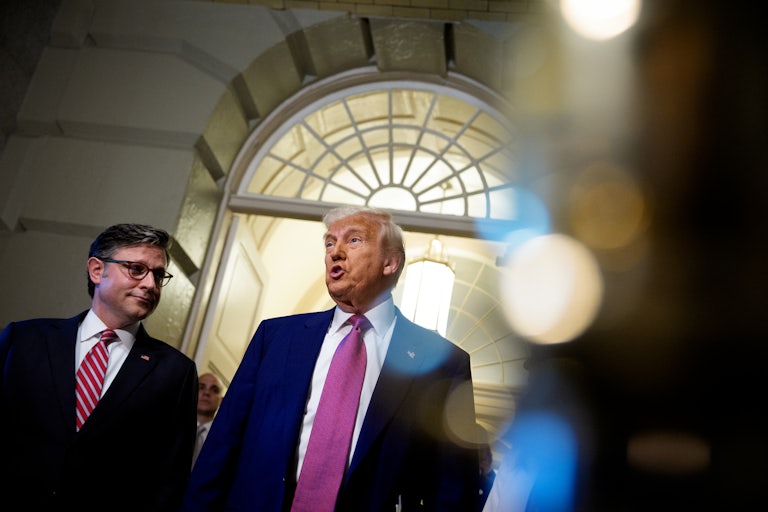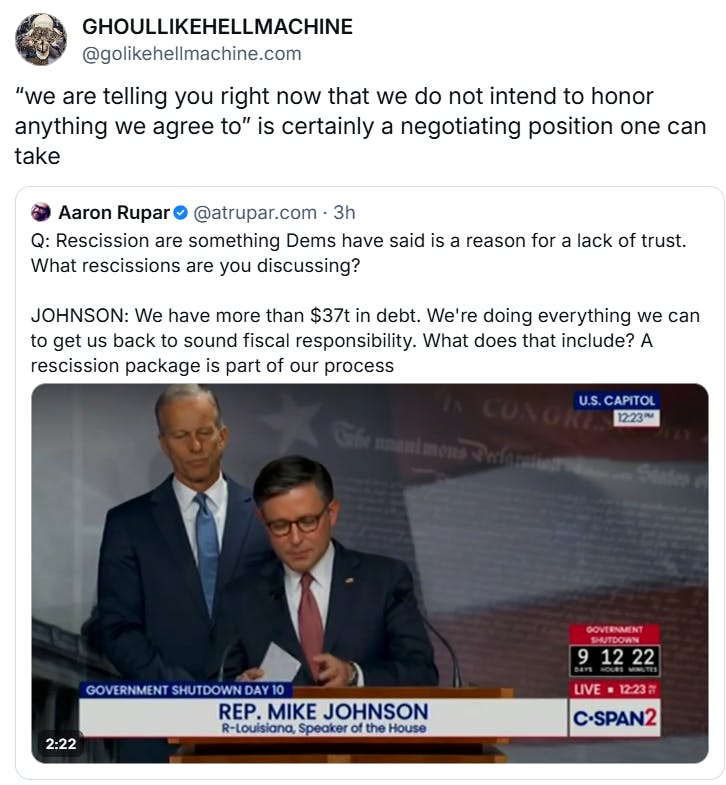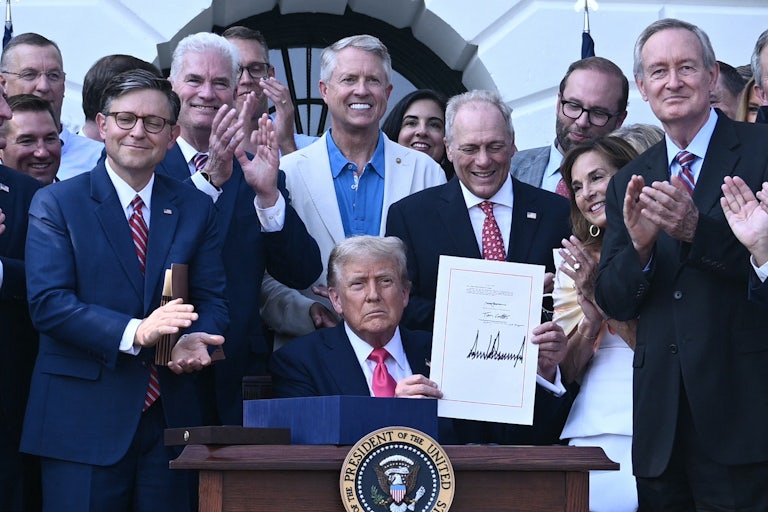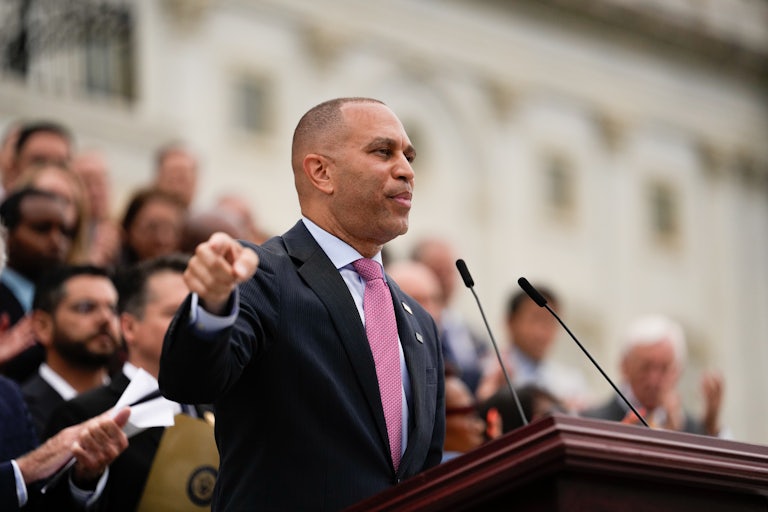Senate Democrats: Get Your Stories Straight!
The senators are sending mixed messages on Trump’s threats to democracy. Time to get it together.

On Tuesday evening, Democratic Senator Jeff Merkley stepped onto the Senate floor to begin a marathon speech that extended well into Wednesday. The topic of his stemwinder was most urgent: “I’ve come to the Senate floor tonight to ring the alarm bells. We’re in the most perilous moment, the biggest threat to our republic since the Civil War. President Trump is shredding our Constitution.” For Merkley, the matter hit close to home, quite literally: “President Trump wants us to believe that Portland, Oregon, in my home state, is full of chaos and riots. Because if he can say to the American people that there are riots, he can say there’s a rebellion. And if there’s a rebellion, he can use that to strengthen his authoritarian grip on our nation.”
One shouldn’t expect the president to be moved by Merkley’s admonishments. And there are not likely to be many Senate Republicans swayed by his overtures. But there were plenty of people on hand who needed to hear what the Oregon lawmaker had to say—specifically, his Democratic Senate colleagues, who haven’t been singing from the same pro-democracy hymnal lately. Merkley’s oration arrives at a time when some spines need stiffening.
The U.S. Senate: For a long while now, it’s where Democratic Party ambitions, along with democracy itself, have hit the skids. There are structural reasons for that: Far fewer voters are represented by the GOP majority, and this malapportionment problem is exacerbated by changing demographics that could one day allow 30 percent of Americans to elect 70 of its senators. But Republicans learned long ago that their agenda—showering tax benefits on the wealthy and breaking the government—only requires 51 votes most of the time. Democratic governance—which involves building, fixing, regulating, preserving, and improving—requires 60 nearly always.
One might have expected by now that Democrats would have recognized how the Senate filibuster, which requires them to regularly conjure these supermajorities, is something of a suicide pact. Or that it’s a recent innovation that’s easily discarded. Or that it runs so counter to the Founders’ ideals that its very existence should be offensive. But not enough Democrats have made this leap. And the reason is that too many of them suffer from what The New Republic contributor Christopher Sprigman calls “Degenerative Senate Brain.”
Having observed this less than august body operate over the past few years, I think that the main problem with many of our Democratic senators is that they believe their own hype. They all think they’ve signed up for an austere debate club—the “world’s greatest deliberative body,” the “cooling saucer” of government. They don’t seem to have noticed that when it comes to deliberating, or maintaining a reputation for judiciousness and equanimity, everyone has to agree to participate in those ideals. And Trumpist Republicans do not: They’ve shut down the government. They’ve willingly ceded the power of the purse. They rarely if ever question the Mad King’s desires. Do you remember the public agonizing of Louisiana Republican Bill Cassidy over Robert F. Kennedy Jr.’s appointment to Health and Human Services? And then Cassidy ended up meekly endorsing him, to Cassidy’s lasting chagrin? That’s about as robust as GOP deliberations get.
The state of the GOP means that you can’t really have a Senate anymore. Unfortunately, the most Senate-brained Democrats still naïvely believe that they can revive this moribund body, through actions that at best send mixed messages and at worst directly undermine the work of Democrats like Jeff Merkley.
Case in point: This week, amid the government shutdown, 13 Democratic senators joined forces with all but one Republican to advance the nomination of Harold Mooty to a judgeship in the Northern District of Alabama. Some fun facts about Mooty that The New Republic’s Ellie Quinlan Houghtaling collected: He has gone to some lengths to dance questions about the January 6 riots and who was culpable; he practically invented new verb tenses to avoid saying directly that Joe Biden was the legitimately elected president.
When it comes to deal-breakers, to each their own, but I find it puzzling that these weren’t some crimson flags for Senate Democrats. But even if they weren’t, everyone should understand that the only role a Republican judicial nominee plays in American life is serving Trump as if he was their personal legal client and backstopping his savage corruption. For that reason alone, there should never be a Democratic name signed to the advancement of Trump’s judges.
Why would 13 Democrats (and Maine independent Angus King, who I find too tiresome to explain to people) do such a thing? My theory is this: In their own skewed, Senate-brained view of the world, taking these kinds of votes helps to bolster democracy. That is to say, any time there is a small window in which they can make a gesture of comity and bipartisanship, they believe the right thing to do is to take it—the better to demonstrate that the ol’ ship of state is still humming along, normal business and regular order is possible, and that we aren’t so far off from recovery. Democrats are leaving the door to deliberation open. They’re keeping that saucer on ice.
Folks, I would love to believe that a small overture might seed a future coming together of polarized parties. But if watching schoolchildren get shot to pieces several times a year isn’t going to foster that fellowship, then we’re definitely not getting there by throwing the other side a bone in the form of Harold Mooty. The government is shut down, there’s a hole in the White House, the president is ordering extrajudicial killings in Latin America as part of some run-up to a regime change war, and citizens are getting snatched off the streets by Brett Kavanaugh–inspired goons. The system so loved by the Senate-brained is currently offline! And these votes to approve the odd judicial candidate are simply small enabling acts that only help to fuel the disorder.
Is democracy in grave danger? This week, it looks like Merkley and his allies agree, and that 13 other Democrats aren’t really ready to believe him. But with midterms looming, everyone in the party has to be of one mind on the matter in order to not sow confusion among critical voters. And if they all truly agree that Trump is some unique threat, we cannot have Democrats in double digits signing their name to support his agenda—not now, not ever.
This article first appeared in Power Mad, a weekly TNR newsletter authored by deputy editor Jason Linkins. Sign up here.









